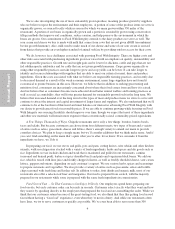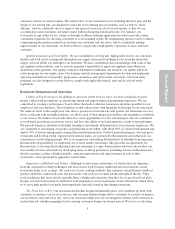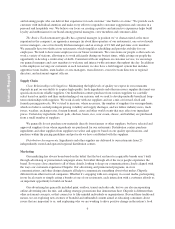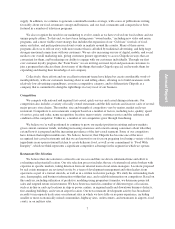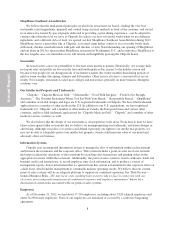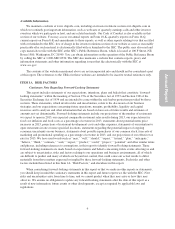Chipotle 2012 Annual Report Download - page 16
Download and view the complete annual report
Please find page 16 of the 2012 Chipotle annual report below. You can navigate through the pages in the report by either clicking on the pages listed below, or by using the keyword search tool below to find specific information within the annual report.
“Regulatory and Legal Risks—Governmental regulation in one or more of the following areas may adversely
affect our existing and future operations and results, including by harming our ability to open new restaurants or
increasing our operating costs—Labor and Employment Regulations.”), as well as competition, increased
minimum wage requirements, and any changes in our restaurant staffing structure would adversely impact our
operating costs. Our success also depends in part on the energy and skills of our employees and our ability to
hire, motivate and keep qualified employees, especially general managers and crew members. As we grow, we
believe we will need to promote or hire additional top-performing field leaders to ensure we hire and motivate
good managers and crew, and it may be difficult to identify and keep those field leaders. Our failure to find and
keep enough employees who are a good fit with our culture could delay planned restaurant openings, result in
higher employee turnover or erode our employee and restaurant cultures, any of which could have a material
adverse effect on our business and results of operations. Restaurant operators have traditionally experienced
relatively high employee turnover rates. Any increase in our turnover rates for managers or crew could be costly.
Various states in which we operate are considering or have already adopted new immigration laws, and the
U.S. Congress and Department of Homeland Security from time to time consider or implement changes to
Federal immigration laws, regulations or enforcement programs as well. Changes in immigration or work
authorization laws may increase our obligations for compliance and oversight, which could subject us to
additional costs and make our hiring process more cumbersome, or reduce the availability of potential
employees. Although we require all workers to provide us with government-specified documentation evidencing
their employment eligibility, some of our employees may, without our knowledge, be unauthorized workers. This
may subject us to fines or penalties, and we could experience adverse publicity that negatively impacts our brand
and may make it more difficult to hire and keep qualified employees. For example, following an audit by the
Department of Homeland Security of the work authorization documents of our restaurant employees in
Minnesota during 2010, we lost approximately 450 employees, resulting in a temporary increase in labor costs
and disruption of our operations, including slower throughput, as we trained new employees, as well as some
degree of negative publicity. We are currently undergoing a similar audit in Virginia and the District of
Columbia, and in April 2011 we received notice from the office of the U.S. Attorney for the District of Columbia
that it is conducting an investigation into these matters through its criminal division. See Note 9 “Commitments
and Contingencies” in our consolidated financial statements included in Item 8. “Financial Statements and
Supplementary Data.” Termination of a significant number of employees in those or other markets or across our
company would disrupt our operations including slowing our throughput, and could also cause additional adverse
publicity and temporary increases in our labor costs as we train new employees. Our financial performance may
be materially harmed as a result of any of these factors.
Because we do not franchise, risks associated with hiring and maintaining a large workforce, including
increases in wage rates or the cost of employee benefits, compliance with laws and regulations related to the
hiring, payment and termination of employees, and employee-related litigation, may be more pronounced for us
than for restaurant companies that shift some or all of these risks to franchisees.
Instances of food-borne or localized illnesses could cause the temporary closure of some restaurants or
result in negative publicity, thereby resulting in a decline in our sales, and could adversely affect the price and
availability of the meat, produce or dairy we use to prepare our food.
Instances of food-borne illnesses, real or perceived, whether at our restaurants or those of our competitors,
subject us to liability to affected customers, and could result in negative publicity about us or the restaurant
industry that adversely affects our sales. For instance, on a small number of occasions a Chipotle restaurant has
been associated with customer illness, and on those occasions our sales have been adversely impacted, at times
even in markets beyond those impacted by the illness. The risk of illnesses associated with our food might
increase in connection with an expansion of our catering business or other situations in which our food is served
in conditions we cannot control. If our customers become ill from food-borne or localized illnesses or attribute an
illness to our food, we could be forced to temporarily close some restaurants. A decrease in customer traffic as a
result of these health concerns or negative publicity, or as a result of a change in our menu or dining experience
or a temporary closure of any of our restaurants, would adversely impact our restaurant sales and profitability.
14
Annual Report


